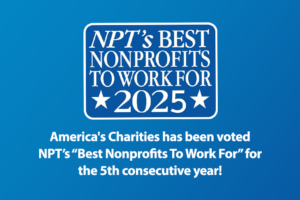Food for Others | November 15, 2017
Why Fairfax County Needs a Food Bank
 People ask us all the time why Fairfax County needs a food bank. Just do the math.
People ask us all the time why Fairfax County needs a food bank. Just do the math.
In 2015, Fairfax County had a median family income of $129,538 a year. The average housing rental cost was $1687 a month. The poverty level for a family of four is now $24,600 a year. And, of course, the national minimum wage is still $7.25 an hour.
So, a married couple with two children who each work 40 hours a week for fifty weeks at minimum wage will earn $29,000 a year. Let’s say they are paying 75% of the average housing rental cost a month, $1265. That means they are paying over half their income just for rent. “You should spend no more than 30 percent of your income on housing”—that is the rule of thumb you will hear from a financial adviser or a parent, a landlord or a lender. “Thirty percent for rent”—it’s embedded in online budget calculators and federal policies.
So there is a large population of renters in Fairfax County who spend way more than is recommended for rent, on apartments that are basic at best.
Once the rent is paid, these renters have to cope with the cost of living in Fairfax County. Cost of living indices are based on a US average of 100. An amount below 100 means Fairfax County is cheaper than the US average. A cost of living index above 100 means Fairfax County is more expensive. Fairfax County’s cost of living is 157.20.
In other words, Fairfax County needs a food bank because it is very easy to be poor in Fairfax County.
In addition, these cold calculations are somewhat optimistic, not accounting for all the one-income families, the single mothers, the people in low-wage jobs whose hours have been cut back to deprive them of benefits, or the people who are sick or disabled or living only on Social Security.
Providing food to these families eases their situation somewhat. Food for Others cannot supply all their food needs, but we are a significant help to many.
The non-poor families of Fairfax County rely on Food for Others clients to cut their grass, care for their children and elders, run fast-food outlets, and do all the other low-wage jobs that are part and parcel of our country today. Because these jobs do not command a living wage, especially in Fairfax County, the food bank is needed to keep these families afloat, along with many other public and non-profit social services. People and organizations that contribute to Food for Others recognize these needs, and recognize that what poor people in Fairfax County are up against. Without groups like Food for Others, many families here could not meet their basic food needs.
As long as this cruel math persists, the need for Food for Others and all the other non-profit service providers in Fairfax County will be acute. As long as the cost of living here far exceeds the wage requirements of employers, this situation will continue. Our clients number in the tens of thousands; our donated pounds of food number in the millions. We are filling a basic human need for a broad sector of the Fairfax County population.
This is why Fairfax County needs a food bank.
Through a donation to Food for Others, you can help address this need and donating via payroll deduction through your employer’s workplace giving program makes it easy. For example, here are a few ways your donation can help:
- $5 ($0.21 per pay period): a dozen eggs for 8 families
- $20 ($0.83 per pay period): a gallon of milk for 12 families
- $50 ($2.08 per pay period): Power Packs (food placed in weekend backpacks by counselors) for 12 students
- $100 ($4.17 per pay period): a dozen eggs and a bag of rice for 120 families
- $250 ($10.42 per pay period): a dozen eggs, a gallon of milk, a bag of dried beans, and a bag of brown rice for 64 families
- $300 ($12.50 per pay period): a gallon of milk & a dozen eggs for 100 households
- $1,000 ($42 per pay period): Power Packs for 250 elementary school students in need
Support Food for Others through your employee giving program:
As a donor, you can support Food for Others by donating to them through your employer’s workplace giving program (CFC# 40790 if you’re a military or federal employee participating in the Combined Federal Campaign). Payroll pledges made through employer-sponsored charitable giving programs represent a cost effective and near effortless way to support your favorite charities.
As Food for Others’ workplace giving partner, America’s Charities can help your company design and implement a program centered on supporting their work – through workplace giving campaigns, employee fundraising, cause-focused signature programs, volunteerism, donation drives, matching gifts, Dollars-for-Doers, In-Kind Giving and other employee engagement and philanthropic initiatives. Click here to request a demo and learn how we can help you do this.
Get Resources and Insights Straight To Your Inbox
Explore More Articles
For Fifth Consecutive Year America’s Charities Named ‘Best Nonprofit To Work For’
Washington, D.C. – April 1, 2025 – America’s Charities, the nonprofit that mobilizes the power of giving as a leading provider of volunteering, workplace giving,…
Read ArticleWorkplace Fundraising + Volunteering Summit (April 2nd and 3rd, 2025)
Join us in attending this virtual summit! The America’s Charities team is joining up with other leading voices in the workplace giving space for a…
Read ArticleThe Time to Act is Now
The results of the 2024 National Assessment of Educational Progress (NAEP) are in, and the findings are, in a word, heartbreaking. This assessment serves as…
Read ArticleGet Resources and Insights Straight To Your Inbox
Receive our monthly/bi-monthly newsletter filled with information about causes, nonprofit impact, and topics important for corporate social responsibility and employee engagement professionals, including disaster response, workplace giving, matching gifts, employee assistance funds, volunteering, scholarship award program management, grantmaking, and other philanthropic initiatives.




